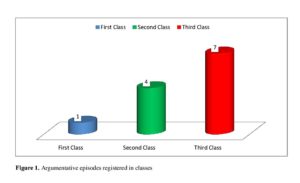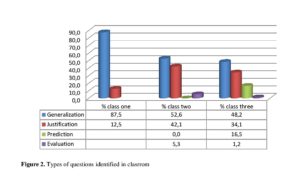ISSA Proceedings 2014 ~ Changes In The Use Of The Question When Teaching To Argue In Sciences
Abtract : This study shows the changes identified in the type of questions used by an elementary school teacher, who participated in a process of critical reflection on the teaching of argumentation in science class. In this study, three classes were recorded (before, during and after the process), and after discourse analysis realized to information collected, the results show how the teacher understands the importance of combining different kinds of questions: descriptive, causal and evaluative, questions.
Keywords: Argumentation, reflective critical process, science education,
1. Introduction
The importance of argumentation in the science class is supported by numerous studies. On the one hand, some research shows that students involved in argumentative activities can better understand how science is produced and validated (Driver et al. 2000, Osborne et al. 2004), while improving their communication skills (Kuhn & Udell, 2003). These findings justify giving a priority to discourse practices and, specifically, argumentative processes in school settings. On the other hand, despite the fact that there are many studies highlighting how teachers’ thinking influences classroom practices (Benarroch & Marin, 2011; Ireland, Watters, Brownlee & Lupton, 2011; Gunstone et al, 1993; Lebak & Tinsley, 2010 , Milner, Sondergeld, Demir, Johnson & Czerniak, 2012; Porlan et al., 2010, Smart & Marsall, 2012), few studies try to identify how teachers promote classroom argumentation and understand how the teachers’ thinking, related to what it is supposed to be argued in science, influences the way to promote classroom argumentation.
Also, we know that the argumentation as a social practice demands that the teaching of the sciences must be focus in the importance and relevance at least of two components. First, the epistemic; the acknowledgement of the role of the argumentation in the construction of the science is taken as a central element. The second component: the social, requires offering spaces to promote debate and work in small groups to give the possibility to listen to the other and to establish their own ideas.
In this sense, the question becomes one of the possible tools to support these previous aspects: the epistemic and the social. The first one because the scientific knowledge advances when it asks questions which establish a dialogue about theory and observable phenomenon, allowing to explain, to structure and to change the condition of a theory, (Kuhn, 2010; McDonald & McRobbie, 2012; Milne 2012; Osborne, Erduran & Simon, 2004; Sardà & Sanmartí, 2000). The second one; because in order to try to rebuild scholar scientific knowledge; it is mandatory to provide classroom social interactive moments (Mercer, 1997), to foster in the students not only the interest but also the motivation to establish their own questions, problems and basic actions of the “to do science” (Márquez & Roca, 2006).
From this perspective, the research tries to identify the changes in the kinds of questions worked by an elementary school teacher who participates in a critical reflexive process about the teaching of the argumentation in the science class.
2. Methodology
The study was focused in the process developed by a teacher who Works with children from nine to ten years old. They belong to a public elementary school institution from Manizales city (Colombia) Called Fe y Alegría. To obtain the stated goal, during seven months of work there were programmed three critical reflexive meetings, – which included several surveys, questionnaires and interviews, to discuss topics related to the argumentation and to the teachers performance inside the classroom. On the other hand, there were three classes recorded by audio and video, coded and analyzed during three moments of the process. These classes were transcribed using the note taking proposed by Candela (1999) and systematized with the software Atlas-ti help. The analysis developed to this information was comprehensive-qualitative from which was identified the communicative interaction between the teacher and the students, as consequence of identifying and analyzing the argumentative episodes (EA) in each one of these three classes. The episodes, in this research are assumed as the sequences of interactions between students-teacher, in which these communicative interactions are recognized and supported by the dialogic inquiry, or the use of questions that besides of working an specific content (conceptual, procedural or attitudinal) foster dialogues and debates among the subjects with the final goal to promote the argumentation in an implicit or explicit form.
3. Analysis of the results
Two important aspects of the teacher´s performance can be identified in the exhibited results in the figure 1 and 2.
The first one, related with the increasing in the number of EA registered in the developed classes by the teacher (one in the first class, four in the second one and seven in the third one). This shows the advance and consolidation of the dialogic inquiry, as a mechanism of communicative interaction teacher-students and the unforgettable tool for the development of the argumentation.
The second aspect refers to the increasing incorporation, of new kinds of questions. It was noticed how the teacher used to ask generalization questions in the first class (87.5%, e.g.: the water is?) and rational questions (12.5%: why do the trees belong to the plant kingdom?). With the first ones, it is stated the relationship between the theoretical content and the studied situation; with the second ones it is asked to the student to expose the why of an action, or the participation, forcing
him/her to present evidences or justifications that support their affirmations. In the second class, besides the decrease of the percentage of the generalization questions (52,6%) and the rising in the percentage of the justification questions (42,1%: why could they have the reason, they that 500 they that 100 or they that 80?), the teacher uses also the evaluative questions (5,3%: …let´s see what do you think?), those which promote reflection about the implicit contents in their participation and foster confrontations that affect positively the development of argumentative processes in the classroom. In the third one, we could notice the presence of a new kind of questions, the predictive (16,5%: do you believe that the violin will be heard under the water? Now from what we have seen, you are going to tell me why yes or why not, Emanuel, do you feel OK? Do you think that the violin will be heard the same way under the water?); with those questions the student is invited to establish hypothesis and to ask questions about possible behaviors, facts or phenomena, which are very important actions to the development of argumentative processes.
4. Conclusions and educative implications
The teacher provides better and larger communicative interactive spaces supported by the dialogic inquiry. Two indicators show this advance in the developed process by the teacher. First, the incorporation of questions from different nature and the confident environment created by the teacher, in order to engage the students in the discussions. Second indicator the increasing of the quantity of argumentative episodes identified in the three classes developed by the teacher: one in the first one, four in the second one and seven in the third one.
Finally, the results ratify two things: The first one, the value that the question has; and the combination of different kinds of questions, as a device to foster the debate and the development of very important competences as the quality to hear and respect others opinion to argue in a proper way. The second one; the relevance to involve to the teachers in critical reflexive space about their own performance, as an opportunity to help to the improvement of the sciences teaching processes.
Acknowledgements
Based on work supported by Spanish MCYT grant EDU-2009-13890-C02-02, Spanish MCYT grant EDU-2012-38022-C02-02 and Catalan PRI 2009SGR1543 . From the same way the acknowledgement to Caldas university, Manizales – Colombia.
References
Benarroch, A. & Marín, N. (20011). Relaciones entre creencias sobre enseñanza, aprendizaje y conocimiento de ciencias. Enseñanza de las Ciencias. 29(2), 289-304
Candela, A. (1999). Ciencia en el aula. Los alumnos entre la argumentación y el consenso. México: Paidós.
Driver, R., Newton, P & Osborne, J. (2000). Establishing the Norms of Scientific Argumentation in Classrooms. Science Education, 84(3), 287-312.
Gunstone, R., Slattery, M., Bair, J. & Northfield, J. (1993). A case study exploration of development in preservice science teachers. Science Education, 77(1), 47-73.
Ireland, J., Watters, J., Brownlee, J., & Lupton, M. (2011). Teachers’ conceptions of how to engage students through inquiry learning: Foundations for STEM. In Proceedings of the 1st International Conference of STEM in Education 2010, Queensland University of Technology, Queensland University of Technology, Brisbane, QLD.
Kuhn, D. (2010). Teaching and learning science as argument. Science Education, 94(5), 810–824.
Kuhn, D., & Udell, W. (2003). The development of argument skills. Child Development, 74, 1245 – 1260.
Lebak, K. & Tinsley, R. (2010). Can inquiry and reflection be contagious? Science teachers, students, and action research. Journal of Science Teacher Education, 21(8).
Márquez, C. & Roca, M. (2006). Plantear preguntas: un punto de partida para aprender ciencias. Educación y Pedagogía, 18(44), 63-71.
McDonal, Ch. y McRobbie, C. (2012) Utilising Argumentation to Teach Nature of Science. In B. Fraser, C. McRobbie & K. Tobin (Eds), Second International Handbook of Science Education (pp. 969-985). New York: Springer International Handbooks of Education.
Milne, C. (2012). Beyond Argument in Science: Science Education as Connected and Separate Knowing. In B. Fraser, C. McRobbie & K. Tobin (Eds), Second International Handbook of Science Education (pp. 951-967). New York: Springer International Handbooks of Education.Osborne, J., Erduran, S. & Simon, S. (2004). Enhancing the quality of argumentation in school science. Journal of Research in Science Teaching, 41(10), 994-1020.
Milner, A., Sondergeld, T., Demir, A., Johnson, C., & Czerniak, C. (2012). Elementary teachers’ beliefs about teaching science and classroom practice: An examination of pre/post NCLB testing in science. Journal of Science Teacher Education, 23(2), 111-132. doi: 10.1007/s10972-011-9230-7
Mercer, N. (1997). La construcción guiada del conocimiento. Barcelona: Paidós.
Porlán, R., Martín del Pozo, R., Riviero, A., Harres, J., Azcárate, P. & Pizzato, M. (2010). El cambio del profesorado de ciencias I: Marco teórico y formativo. Enseñanza de las ciencias, 28(1), 31-46.
Sardà, A. (2005). Enseñando a argumentar en torno a la educación ambiental. Educar. Recupero de http://www.quadernsdigitals.net/datos/hemeroteca/r_24/nr_655/a_8779/8779.pdf

